IM Group (IMG (UK) Holdings Limited and its subsidiary entities) recognises that the potential for modern slavery exists in many sectors, and we must do everything we can to prevent any form of slavery, human trafficking, or any other unethical behaviour.
We are dedicated to developing, implementing, and enforcing effective systems and controls to ensure that we address the threat of modern slavery within our business and in our supply chains.
We have zero-tolerance for slavery and human trafficking, and we expect our supply chains to take the same stance.
This statement is IM Group’s seventh modern slavery statement. It sets out the steps that IM Group and its subsidiary companies have taken during the financial year ending December 2023 to combat slavery and human trafficking in our business and supply chains.
Link as seen in Figure 1.
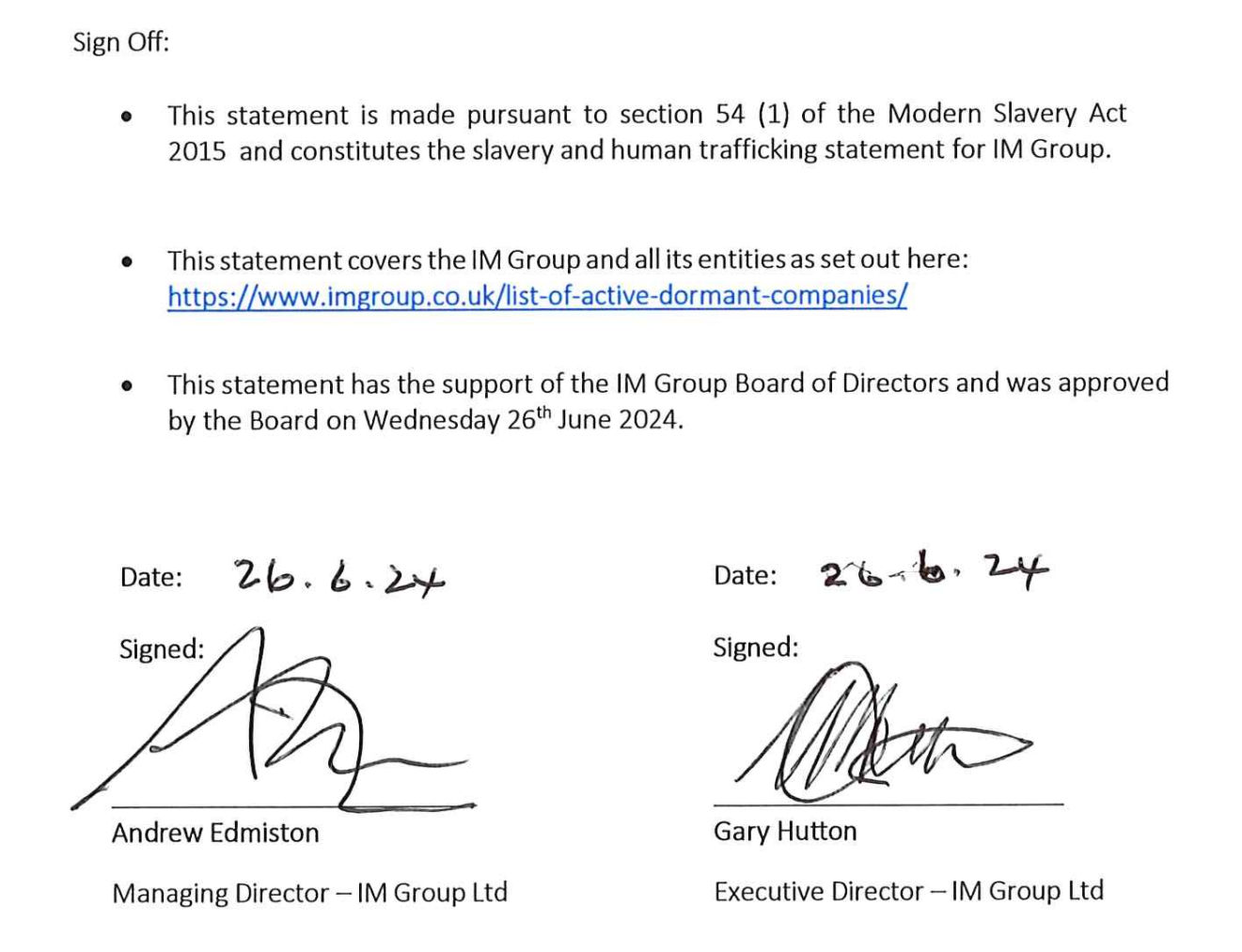
Our Business And Supply Chain
IM Group is a large, family owned, international company established in 1977. The Group operates a diverse portfolio of companies in the automotive, property and finance sectors. Our specialist independent, exporter expertise and local market knowledge is used to support our business partners to achieve our Modern slavery goals. Our head office is in Solihull with other offices in the UK, Ireland, USA, China, Baltics and Nordic countries.
Employees:
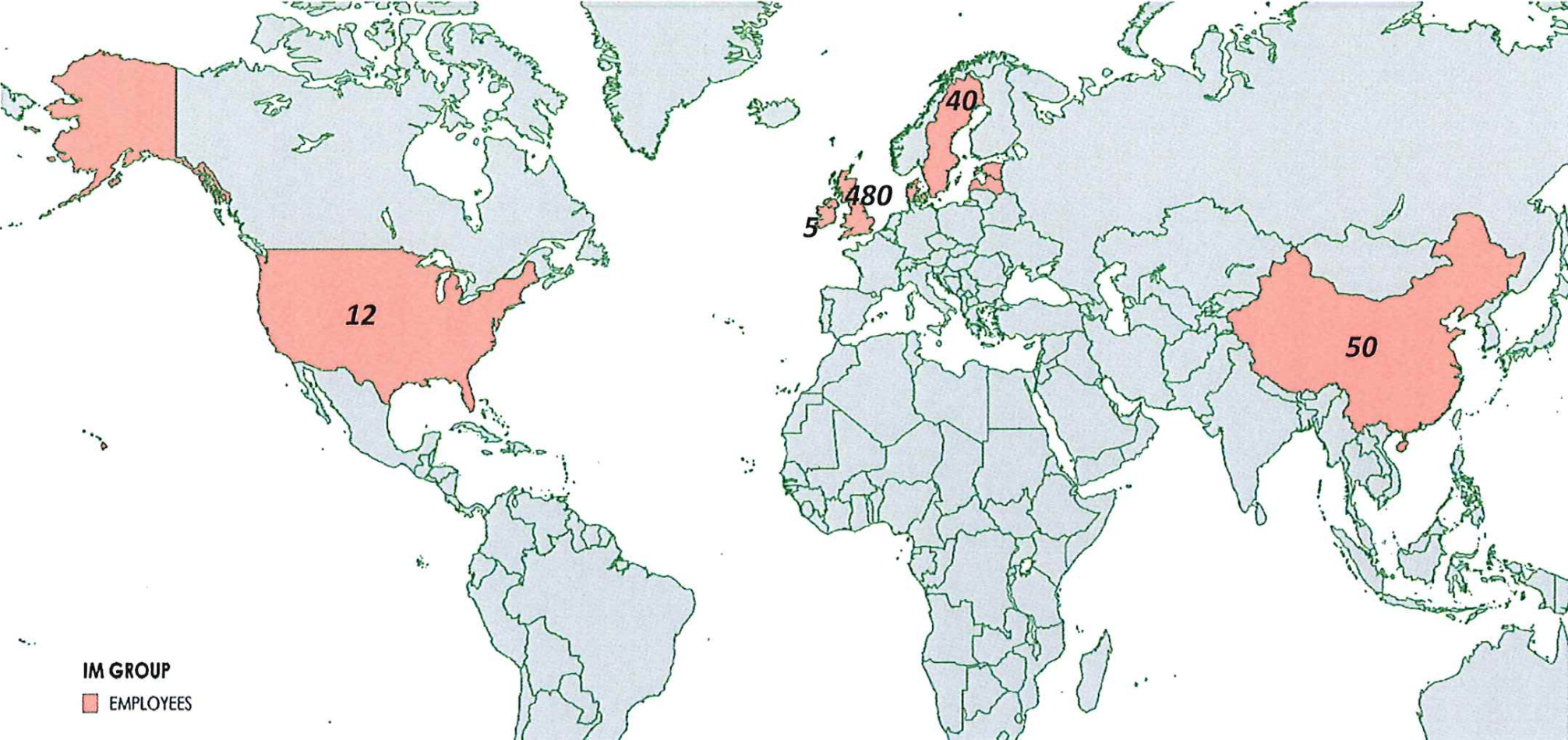
Suppliers

Through our diverse business portfolio, we procure a wide range of goods and services. Our core businesses each have a specific supply chain footprint with different characteristics, challenges and opportunities.
We have mapped our suppliers in rank to high/medium/low risk which enable us to prioritise our actions as below.
Governance
The IM Group board and the management board is made up of the Chairman, Executive Director and Management Directors of IM Group’s automobile and property businesses. Regular contribution to these quarterly meetings is from HR, ESG, IT, Finance, Tax, Legal and Litigation teams.
Our compliance department works alongside the business development team and property teams to design and implement our modern slavery strategy in all our locations. The Director of Compliance who is part of the ESG committee, reports to the board.
The Board has established an Environmental, Social and Governance (ESG) committee that provides direction on the group’s long-term approach to ESG, monitoring developments in this space and provides oversight and support to the Board on the potential risk for modern slavery and our approach. The ESG Committee is made up of MD’s, Senior Directors, HR and Communications team members. The committee meet quarterly, and formal minutes are taken.
Policies
We have developed global and local policies and practices to set consistent standards throughout our operations and those most relevant to Modern Slavery are:
• Business Code of Conduct Policy
• Supplier Code of Conduct
• Modern Slavery Policy
• Whistleblowing Policy
• Equality, Diversity, and Inclusion Policy
• Anti-Bribery & Corruption Policy
• HR policies relating to employment including Grievance.
Our policy statements can be found here:
Modern Slavery Statement End of Year December 2022
Bribery & Corruption Policy Statement
Whistleblowing Policy Statement
Equality, Diversity, & Inclusion Policy Statement
The IM Group Modern Slavery policy reflects our zero-tolerance approach to modern slavery in our business and our supply chains and our long-standing commitment to:
• Acting ethically and with integrity in all our business dealings and relationships.
Implementing effective systems and controls to enable IM Group to identify, mitigate, address, and remediate any concern of modern slavery or labour exploitation within our own business’ or that of our supply chain.
• Ensuring that there is transparency in our business and in our approach to tackling modern slavery that is consistent with our disclosure obligations under the Modern Slavery Act 2015
• Encouraging openness and providing support to anyone who raises concerns relating to Modern Slavery.
• Continue to promote awareness with employees and across our supply chain and monitor performance to ensure that the people we hire or who work in our supply chain are respected and are free to work in an environment free from modern slavery or labour exploitation.
The standards align to the principles of the Ethical Trading Initiative (ETI Base Code):
• Employment is freely chosen
• Freedom of association & the right to collective bargaining are respected
• Working conditions are safe & hygienic
• Child labour shall not be used
• Living wages are paid
• Working hours are not excessive
• No discrimination is practiced
• Regular employment is provided
• No harsh or inhumane treatment is allowed
Whistleblowing
All employees are encouraged to be vigilant to unethical practices and report concerns with regards to Modern Slavery and Labour Exploitation. All allegations and concerns will be taken seriously. Action will be taken to investigate any breaches of our policies. Our Modern Slavery Policy found here confirms that our employees and supply chain partners have a personal responsibility to report any actual or suspected instances of modern slavery within our business or in our supply chain.
• Suspected instances of modern slavery must be reported to an individual’s line manager (in the case of employees) and a member of the IMG HR team at The Gate, HQ.
• Our policies are communicated internally via our SharePoint policy section and externally via our website and issued, where appropriate with contracts and terms and conditions. Suppliers and contractors are informed of a number to call to whistle blow for any concerns, the number is available within documents and on posters and TV screens in publicly accessible places including building site washroom facilities and as part of site induction process.
• IM policies are signed off by the Executive Director and senior management on behalf of the Board and are reviewed on a regular rolling basis.
• We have focused on the building sites and manual labour, along with factories that manufacture parts for our automobile division as we know that these present the highest human rights risks and are therefore a key part in targeting our modern slavery programme effectively.
• All reports are treated confidentially, and we have protection in place for those reporting with a genuine matter.
Due Diligence
Suppliers are asked to confirm their acceptance of our approach to modern slavery. Our standard contract includes a contractual obligation to comply with our clauses relating to the Modern Slavery policy. In this way we explain that we do not tolerate slavery or human trafficking and our suppliers are asked to confirm that they take the same approach in their businesses and in their supply chain. As part of onboarding for all new suppliers within the business, our due diligence process includes consideration of suppliers Ethical and Environmental Practices and seek to identify potential risk in the suppliers supply chain; this includes Modern Slavery. Suppliers for Goods and Services are required, as part of the onboarding process, to confirm that they will abide in their business to our policy in respect of Human Rights.
For supplier management, we have a contract management system facilitated by the Compliance department for the automobile and central group sector of IM Group. Within the property business the commercial teams have responsibility for ensuring compliance with our Modern Slavery policy.
In conjunction with our internal Supplier Code of Conduct procedure and due diligence, we have implemented a modern slavery and human trafficking process setting out the minimum labour standards that we require from all members of our supply chain.
IM Group fosters long-term working relationships with its supply chain members. Our commercial teams regularly engage with their supply chain partners and the business development team to enable due diligence and any remediation needed. We regularly assess our supply chain and conduct desk top analysis that leads to enhanced checks. Teams regularly visit suppliers on the ground and in factories where they try to engage with the workforce and access the work environment. We ensure visits are conducted by different parts of the business to enable the relationship and standards to remain professional and ensure the ethical credentials are maintained.
In addition to our supply chain mapping, we evaluated the nature and extent of our exposure to the risk of modern slavery occurring in our supply chain by conducting a detailed slavery and human trafficking risk assessment. We worked with Slave Free Alliance to identify high risk areas of our business to focus on enhanced due diligence and to build capacity in those areas identified as higher risk where individuals are more likely to be vulnerable.
Where the assessment highlighted high-risk suppliers within the supply chain, for example based on industry, location, employee demographic, recruitment parameters etc…, enhanced due diligence protocol is implemented, including:
• Where we identify instances where we are procuring materials directly from countries on the Global Slavery Index, we will engage with one of our internal or external auditors to carry out a satisfactory ethical audit review prior to making an order. If other issues are identified, appropriate investigative and remedial action is taken; and
• We have focused training for parts of the business identified as more likely to encounter modern slavery and labour exploitation and providing them with the upskilling to identify and escalate any concerns.
We understand that risk assessments are a snapshot in time and do not replace our own continuing due diligence.
Risk Assessment and Management
IM Group, through its subsidiary companies directly and indirectly, purchase products, materials, services, and labour from a diverse portfolio of suppliers, distributors, labour agencies and professional service suppliers. Our supply chain is complex, with multiple tiers stretching across the globe. We have a broad range of suppliers both in size and in terms of the products and services provided.
Identification
We consider that our most significant modern slavery risks are in our supply chains where we undertake procurement activities and where operations and managerial oversight are out of our direct control. This may be due to manufacturers where we have minimal influence over, where we have limited visibility of the workforce and where there is temporary labour hire. Our procedures are designed to establish and assess areas of potential risk in our business and supply chains. To monitor those identified to enable us to reduce the risk of slavery and human trafficking occurring in our business and supply chains and protect those who are vulnerable to modern slavery and labour exploitation.
Some examples of the key supply chain risks that we have identified are as follows:
• Complex supply chains with multiple tiers: the risk of forced labour is the highest in lower tiers where IM group have little visibility.
• Risk of indirect procurement of materials for our projects which are at higher risk of being
produced by child labour or forced labour, for which we have littler oversite/control.
• Employment issues included but not limited to Heath & Safety concerns, significant use of agency workers, temporary workers and migrant workers by our supply chain.
Effectiveness
We also continue to work with Slave-Free Alliance to facilitate training for our staff and to ensure best practice is established within our businesses.
We Partner With:
Founded in 2003, Grace Foundation is funded by IM Group. It exists to transform young people’s lives through holistic education experiences. Employees work closely with Grace Foundation through school engagement programmes to enhance students’ personal development, wellbeing and career aspirations. https://www.grace-foundation.org.uk/
heart of England

The Heart of England Community Foundation exists to support local giving and community investment across the West Midlands and Warwickshire. The Fund supports our social value initiatives by administering our company and project specific Community Funds.
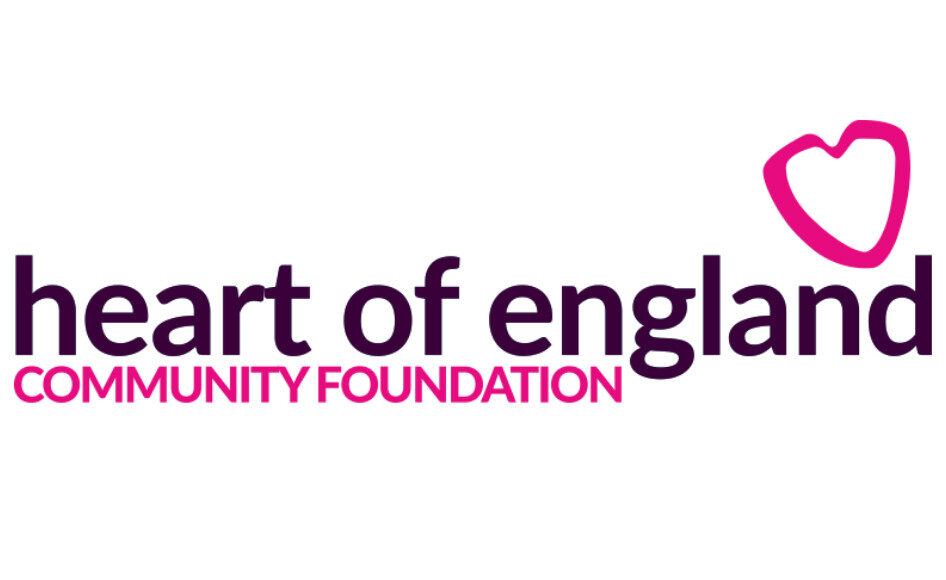
Slave Free Alliance is an international social enterprise, wholly owned by global anti-slavery charity Hope for Justice. SFA supports organisation of all sizes and from many sectors to build their resilience to modern slavery and labour exploitation.
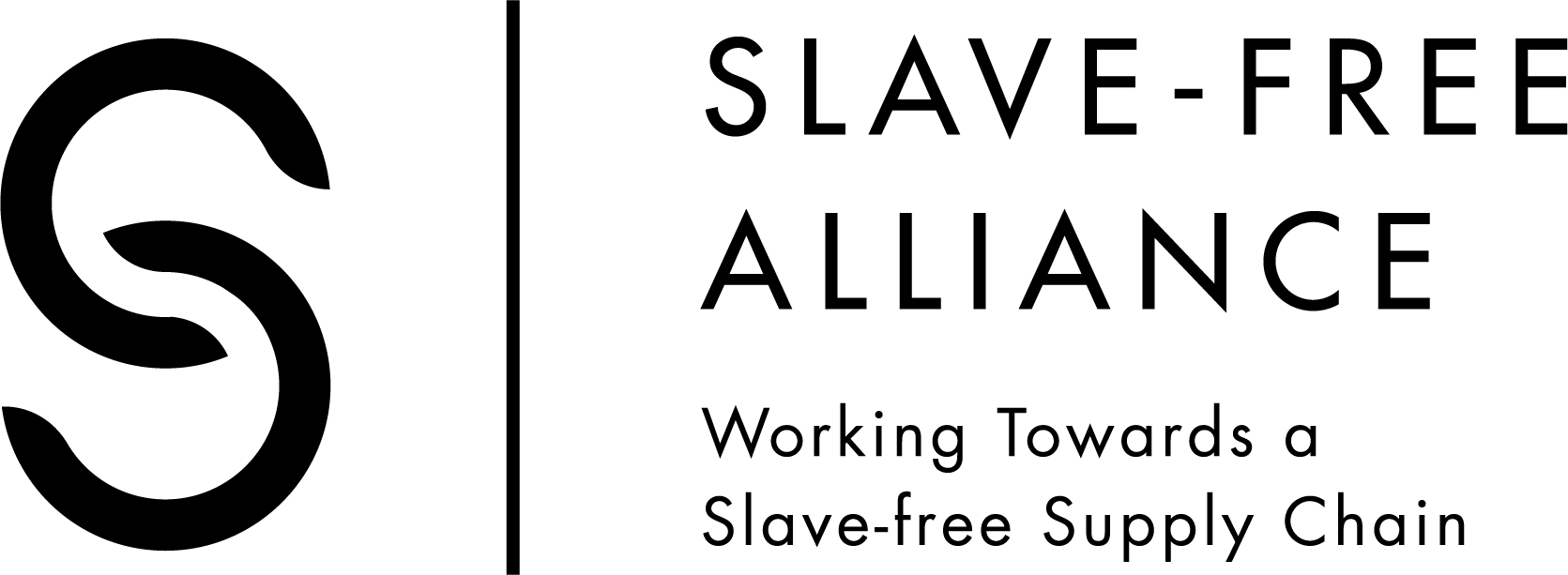
Action Taken in 2023 - Key Strategic Focus
We achieved all the key priorities that we set ourselves for 2023 as outlined in our sixth Modern Slavery statement.
We engaged with our tier one suppliers and reiterated our approach to modern slavery and requested they, confirm agreement to our modern slavery policy. We initially had 70% respond and 70% agree. Those who haven’t responded we are working with to identify any areas of concern or remediation. A subsequent chasing email ensured that the detailed response rate has increased to 90 % respond and agreed, we will continue to work with the remaining 10% There were no specific incidents highlighted, but awareness was raised with all suppliers and many requested further information that we were able to provide.
We used Modern slavery week in October 2023 to inform all employees, throughout the globe, in different ways, relevant to their specific sector, of signs to be aware of and what to do if they had any concerns. Awareness was raised via building signage, looped video clips, visual aids to encourage discussion and highlighted modern slavery policy and the need for each individual in the business to take ownership through awareness of signs to spot modern slavery. Permanent signage in key public spaces where we work have been placed.
Comments from this training included: “I can’t believe it could happen right under my nose, its certainly made me more alert to what’s happening around me”.
Our collaboration with the Slave Free Alliance enabled the HR and Compliance teams to ensure our procedures were more robust and that prompt action would be taken should there be a report or concern around slavery or any associated issues.
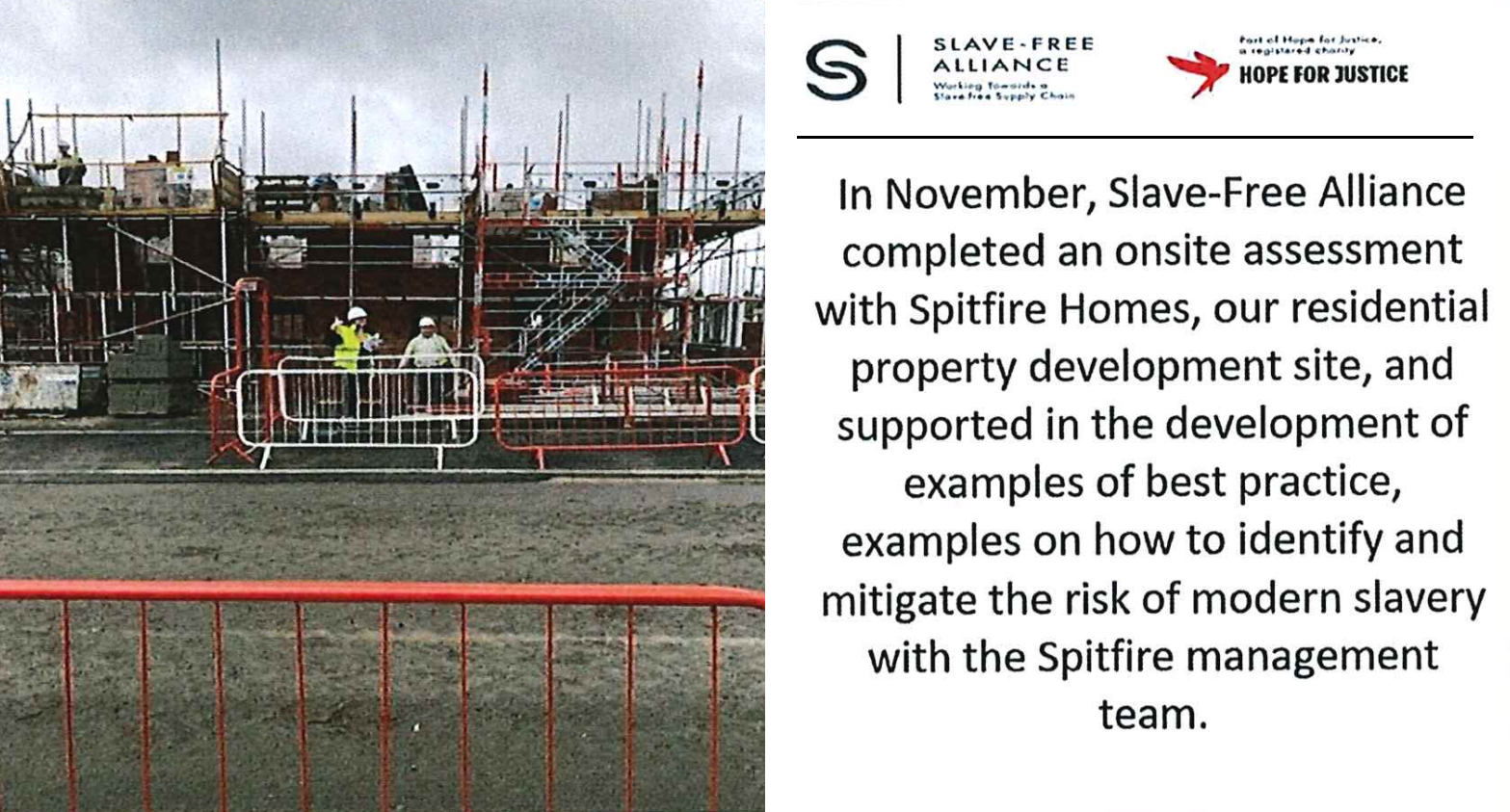
• Our contract administrators successfully implemented proportionate and effective systems and controls through the supplier process. This has resulted in updated supplier forms requiring completion and acceptance of terms and conditions prior to the commencement of any contract. Existing suppliers were required to acknowledge our modern slavery policy and abide by its terms.
• Recruitment for all personnel in the UK, Nordic and USA is managed by the UK HR team and includes a process of application forms followed by face-to-face interviews, identification and basic security and right to work are checked. References as appropriate to the position are also obtained. This has minimised the risk of modern slavery and exploitation entering our operations as we recognise the risk of illegitimate workers being particularly vulnerable to modern slavery and labour exploitation.
• We partner with Slave-Free Alliance who conducted assessments at our request, at two of our building sites, one residential and a second at a large commercial site managed by a contractor. Although, we are pleased to report there were no concerns of modern slavery or labour exploitation identified, SFA supported in providing recommendations to further enhance our approach on site in relation to identifying and mitigating the risk of modern slavery in at construction setting.
• By means of a training and governance structure, established in 2023, we have an aligned approach to modern slavery and labour exploitation whereby we are able to raise the awareness and have impact across the organisation.
2024 Strategic Goals and Focus
This section confirms our next steps and our strategic priorities for 2024. We will review our performance against these objectives and outcomes as part of our modern slavery statement for the year ending 2024.
We will provide specific training, in the local language, for our technical employees and those that visit factories within the categories and regions identified as a higher risk to modern slavery and labour exploitation.
We will review our whistleblowing policy and procedure and will continue to work with SFA who will support in the development of IM Group whistleblowing mechanisms to further enhance our approach. This will enable us to ensure we provide our workers with effective mechanisms to raise concerns in a confidential manner which aligns with our approach to addressing and mitigating the risk of modern. slavery and labour exploitation. We will also promote its function across the business.
We will continue to work with SFA who will support us in the development and review of our policies, including our Principal property terms and conditions ensuring that we further our approach with our suppliers and that we can have assurances that our standards are adhered to within our supply chains and that workers are protected and are not placed in environments or situations akin to modern slavery or labour exploitation.
We will work with SFA to develop modern slavery awareness information for display across our building and construction sites and promote this as part of induction. This will enable us to raise the awareness of modern slavery and labour exploitation in a construction setting to provide moderns slavery indicators within a workforce.
We will continue to review our policies, procedures and working practices in relation to slavery and human trafficking and focus on enhancing our due diligence approach within our supply chains, with the support of SFA.
In particular we will work with our business development team during the procurement process and write questionnaires to assist with consistency at all factory visits so that all technicians and personnel attending will record answers to enable deeper questions where necessary.
We will develop our escalation process with assistance of SFA, including an independent hotline number available for employees, contractors and third party supply chain.
Training and Capacity building in relation to Slavery and Human Trafficking
Training and raising awareness remain key focuses in 2024; to date our modern slavery training and capacity activities have included:
E-Learning: We will continue to invest in educating our staff to recognise the risks of modern slavery and human trafficking in our business and supply chains, Our modern slavery E-Learning module, which will be reinforced by face-to-face-training where appropriate, covers topics such as how to spot the signs of modern slavery and who to contact in the event of a potential instance of modern slavery.
We encourage staff to raise any concerns that they have in relation to modern slavery. We have a robust whistleblowing policy which aims to ensure that our employees are confident that they can raise any matters of genuine concern without fear of reprisals, in the knowledge that they will be taken seriously and that the matters will be investigated appropriately and regarded as confidential.
Anti-slavery day awareness campaigns: Each year we share key modern slavery communication campaigns to co-inside with the anti-slavery day/week throughout all our offices.
To read our previous modern slavery report: Modern Slavery Report December 2022 which is also uploaded to the Government Modern Slavery Registry.
